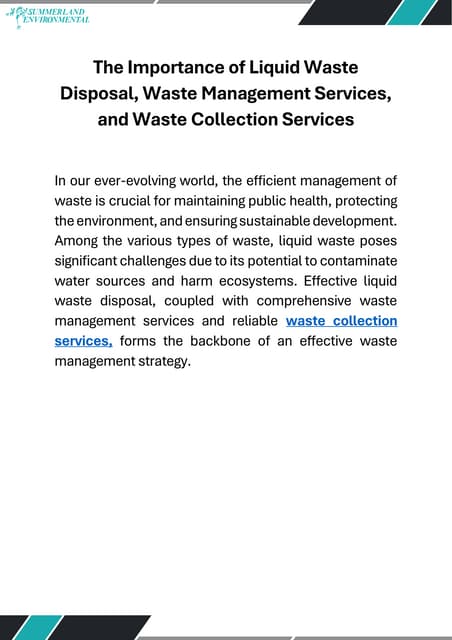All about Reclaim Waste
All about Reclaim Waste
Blog Article
Some Known Factual Statements About Reclaim Waste
Table of ContentsReclaim Waste for BeginnersThe smart Trick of Reclaim Waste That Nobody is Talking AboutExcitement About Reclaim WasteReclaim Waste Fundamentals ExplainedThe Main Principles Of Reclaim Waste
Check out the types, events, and types of fluid waste. Domestic sewage waste describes the waste and items from a property septic system. This kind of waste is developed by human beings in residences, schools, and various other structures. This only includes sewage-disposal tanks that have a drainpipe area. The proper administration and disposal of residential sewer waste require liquid waste to be transferred to a sewage therapy plant where the appropriate techniques and equipment are applied to cleanse and throw away waste.
Industrial waste typically consists of potential hazards, such as combustible materials or a mix of liquid and solid waste products, and needs an advanced and detailed disposal procedure. The disposal of industrial waste generally includes the purification of waste prior to transport to ensure secure and correct disposal. Hazardous waste is produced from by-products and overflow of industrial processes and production.
This kind of waste can not use the same sewage management transport or processes as septic or industrial liquids. The hazardous waste management process requires the examination and testing of liquid waste before it undergoes the disposal procedure (liquid waste disposal melbourne). Overflow waste is the fluid waste that comes from runoff and excess stormwater in extremely booming areas or cities
Drainage waste can trigger contamination and flooding if not taken care of effectively. Making certain correct waste administration can prevent calamities and minimize environmental damage.
Not known Factual Statements About Reclaim Waste
Call PROS Services today to learn more about our waste administration and disposal solutions and the proper means to care for the fluid waste you generate.
(https://medium.com/@leonaube33101/about)Do you know what takes place to your water when you end, flush the commode or drain the washing equipment? No? Well, it deserves recognizing. This supposed 'wastewater' is not just a vital source but, after treatment, will be released to our land, rivers or the ocean. Utilized water from toilets, showers, bathrooms, cooking area sinks, laundries and industrial procedures is known as wastewater.

water utilized to cool equipment or clean plant and tools). Stormwater, a form of wastewater, is drainage that flows from farming and city areas such as roofs, parks, yards, roadways, courses and seamless gutters right into stormwater drains pipes, after rainfall. Stormwater flows unattended straight to neighborhood creeks or rivers, at some point getting to the ocean.
Reclaim Waste for Dummies
In Queensland, many wastewater is dealt with at sewer treatment plants. Wastewater is moved from residential or industrial sites via a system of drains and pump stations, known as sewage reticulation, to a sewer treatment plant. City governments construct, keep and operate most sewer treatment plants. Operators are accredited under the Environmental Management Act 1994 to release cured wastewater at an appropriate ecological criterion right into rivers.
The Division of Natural Resources encourages city governments about managing, operating and keeping sewage systems and therapy plants. In unsewered locations, city governments might need homeowners to install specific or home sewer treatment systems to treat domestic wastewater from toilets, kitchens, shower rooms and washings. The Division of Natural Resources authorises using household systems when they are confirmed to be effective.
In some brand-new neighborhoods, treatment of some stormwater to eliminate clutter, sand and crushed rock has actually started utilizing gross contaminant catches. Wastewater treatment takes place in four phases: Removes strong matter.
Utilizes tiny living microorganisms knows as micro-organisms to damage down and get rid of remaining dissolved wastes and fine bits. Micro-organisms and wastes are incorporated in the sludge.
The smart Trick of Reclaim Waste That Nobody is Talking About
Nutrient removal is not available in any way sewer therapy plants because it calls for expensive specialist equipment. It is becoming a lot more usual in Queensland. Clear fluid effluent produced after therapy might still include disease-causing micro-organisms. If this effluent is released into rivers such as rivers or the sea, the micro-organisms will ultimately pass away out.

Most wastewater flows right into the sewerage system. my link Under the Act, neighborhood federal governments carry out authorizations and licences for ecologically pertinent activities (Periods) including wastewater releases that may have a regional influence.
Some Ideas on Reclaim Waste You Should Know
Tracking supplies valid information regarding water high quality and can verify that licence problems are being fulfilled. The details gotten through tracking supplies the basis for making water quality choices.
Report this page